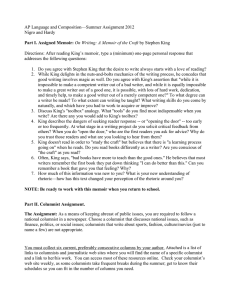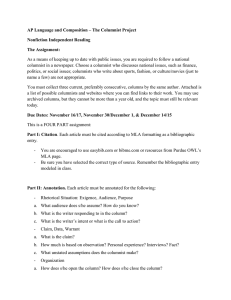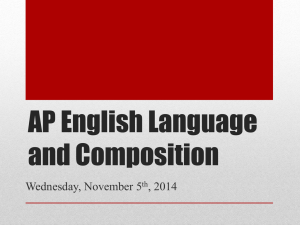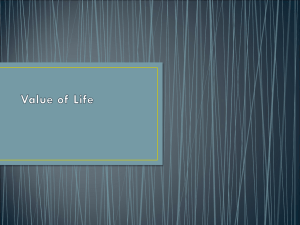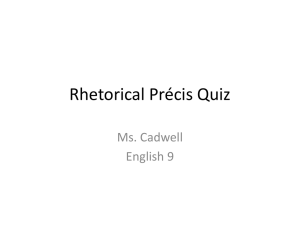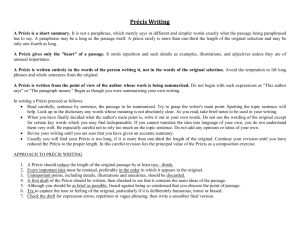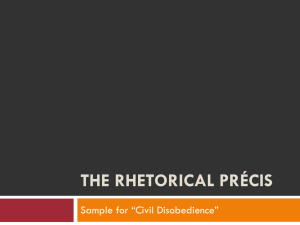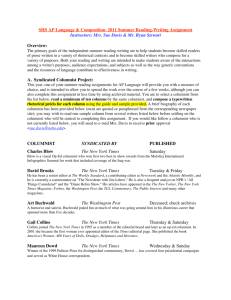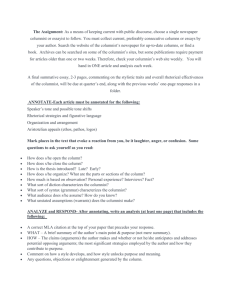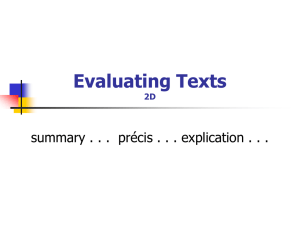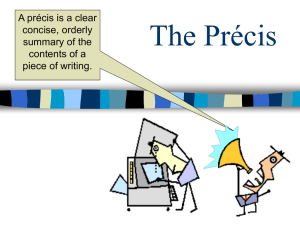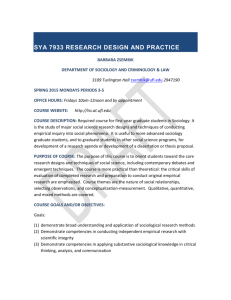AP Language and Composition—Summer Assignment 2013 Nigro
advertisement
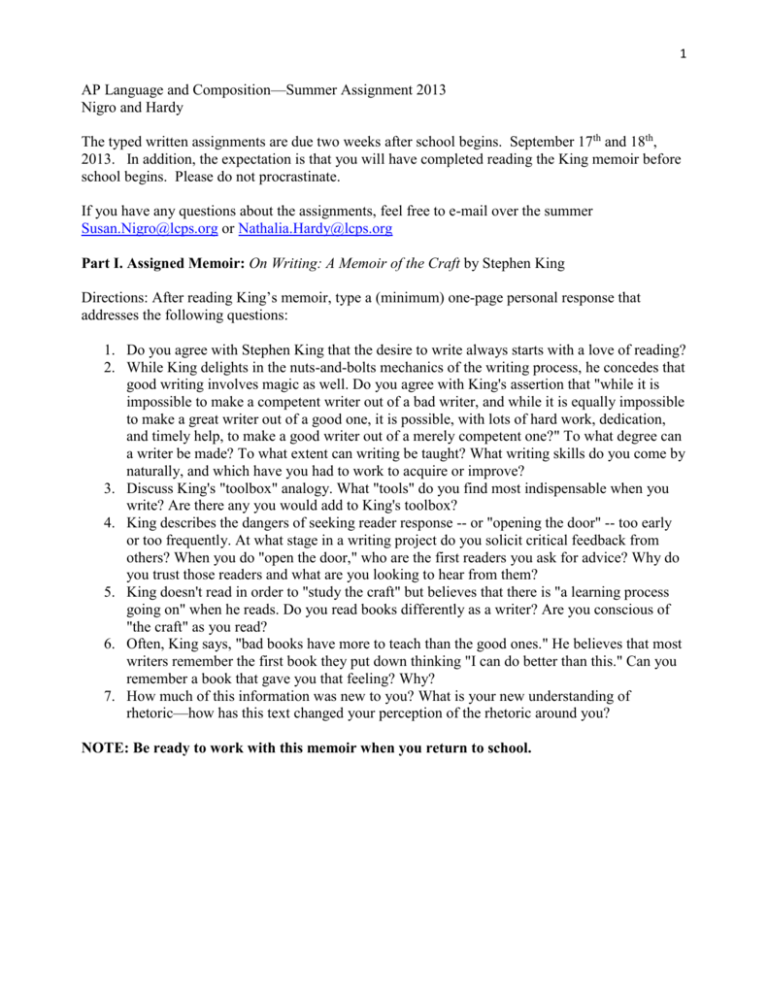
1 AP Language and Composition—Summer Assignment 2013 Nigro and Hardy The typed written assignments are due two weeks after school begins. September 17th and 18th, 2013. In addition, the expectation is that you will have completed reading the King memoir before school begins. Please do not procrastinate. If you have any questions about the assignments, feel free to e-mail over the summer Susan.Nigro@lcps.org or Nathalia.Hardy@lcps.org Part I. Assigned Memoir: On Writing: A Memoir of the Craft by Stephen King Directions: After reading King’s memoir, type a (minimum) one-page personal response that addresses the following questions: 1. Do you agree with Stephen King that the desire to write always starts with a love of reading? 2. While King delights in the nuts-and-bolts mechanics of the writing process, he concedes that good writing involves magic as well. Do you agree with King's assertion that "while it is impossible to make a competent writer out of a bad writer, and while it is equally impossible to make a great writer out of a good one, it is possible, with lots of hard work, dedication, and timely help, to make a good writer out of a merely competent one?" To what degree can a writer be made? To what extent can writing be taught? What writing skills do you come by naturally, and which have you had to work to acquire or improve? 3. Discuss King's "toolbox" analogy. What "tools" do you find most indispensable when you write? Are there any you would add to King's toolbox? 4. King describes the dangers of seeking reader response -- or "opening the door" -- too early or too frequently. At what stage in a writing project do you solicit critical feedback from others? When you do "open the door," who are the first readers you ask for advice? Why do you trust those readers and what are you looking to hear from them? 5. King doesn't read in order to "study the craft" but believes that there is "a learning process going on" when he reads. Do you read books differently as a writer? Are you conscious of "the craft" as you read? 6. Often, King says, "bad books have more to teach than the good ones." He believes that most writers remember the first book they put down thinking "I can do better than this." Can you remember a book that gave you that feeling? Why? 7. How much of this information was new to you? What is your new understanding of rhetoric—how has this text changed your perception of the rhetoric around you? NOTE: Be ready to work with this memoir when you return to school. 2 Part II. Columnist Assignment. The Assignment: As a means of keeping abreast of public issues, you are required to follow a national columnist in a newspaper. Choose a columnist that discusses national issues, such as finance, politics, or social issues; columnists that write about sports, fashion, culture/movies (just to name a few) are not appropriate. You must collect six current, preferably consecutive columns by your author. Attached is a list of links to columnists and journalistic web sites where you will find the name of a specific columnist and a link to her/his work. You can access most of these resources online. Check your columnist’s web site weekly, as some columnists take frequent breaks during the summer; get to know their schedules so you can fit in the number of columns you need. This is a three-part assignment: Materials Due for Columnist Assignment: _____1) 6 Annotated articles _____2) 6 typed, four-line précis, and _____3) 6 typed, one-paragraph responses Part I. Annotation. Each article must be annotated for the following: Speaker's tone and possible tone shifts (Use the attached tone words list for help). Organization Mark places in the text that evoke a reaction from you, be it laughter, anger, or confusion. Some questions to ask yourself as you read: How does s/he open the column? How does s/he close the column? How soon does s/he announce the thesis? How does s/he organize? What are the parts or sections of the column? How much is based on observation? Personal experience? Interviews? Fact? What sort of diction/word choice characterizes the columnist? What sort of syntax characterizes the columnist? What audience does s/he assume? How do you know? What unstated assumptions does the columnist make? 3 Part II. Précis. This must be typed or no grade will be given. After annotating, write a foursentence précis, following the example given below. Writing a Précis Rationale: A précis reveals your understanding of the arguments and points authors make in a specific piece. Composing a précis can be particularly useful when organizing sources for a research project or determining the utility of them. Précis Instructions: When writing your précis, objectively summarize the article in your own words by composing a précis. Note: Before you begin writing your précis, read the column several times to make sure you completely understand the author’s rhetorical situation. Example Précis 1. The first sentence identifies the essay’s author and title, provides the article’s date in parentheses, uses some form of the verb “says” (claims, asserts, suggests, argues) followed by “that,” and the essay’s thesis (paraphrased or quoted). Example: In his “In Defense of Prejudice” (1995), Jonathan Rauch argues that prejudice in society should not be eliminated. 2. The second sentence describes the author’s support for the thesis, usually in chronological order. Example: Rauch supports his position by providing anecdotal and historical evidence culled from segments of society which illustrates the futility and harm associated with attempts to eliminate prejudice. 3. The third sentence analyzes the author’s purpose using an “in order to” statement. Example: Rauch hopes to shift the paradigm away from absolutism, the idea of punitive action against racism and prejudice, in order to move society toward rejection, the idea of societal pressure when grappling with racist and prejudicial attitudes. 4. The fourth sentence describes the essay’s intended audience and/or the relationship the author establishes with the audience. Example: The author uses an erudite yet defensive tone, indicating that he primarily addresses a rather liberal intellectual audience. 4 Part III. Response. This must be typed or no grade will be given. Below the précis, compose your one-paragraph response, noting any questions, objections, or enlightenment the column generated. Some questions you might want to think about/comment on: Do you agree or disagree with the editorial’s viewpoints? Why? Did the editorial make you want to know more about the issue? What are some of the author’s best arguments? What makes them valid? Which arguments or points made by the author do not make sense to you and why? How does this editorial connect with other knowledge that you have from other sources? Examples of suggested newspapers/magazines: Examples of Columnists: The New York Times (US newspaper) The Washington Post (US newspaper) The Times of London (UK newspaper) The Daily Telegraph (UK newspaper) Maclean’s (Canadian news magazine) The Economist (UK news magazine) Time (US news magazine) Newsweek (US news magazine) The New Republic (US political magazine) National Review (US political magazine) The New Yorker (US ideas magazine) Atlantic Monthly (US ideas magazine) Harper’s (US ideas magazine) Stanley Fish Ann Coulter Thomas Sowell Peggy Noonan David Horowitz Maureen Dowd Noam Chomsky Paul Krugman Thomas Friedman David Brooks David Broder George Will Farid Zakaria Please do not select a columnist who is no longer actively writing (for example, Dave Barry). Examples of newspapers/magazines that are not recommended: The Toronto Sun (newspaper) The Toronto Star (newspaper) USA Today (newspaper) Sports Illustrated Fashion, lifestyle, or popular culture/entertainment magazines The Enquirer, The Star, and others of those ilk
